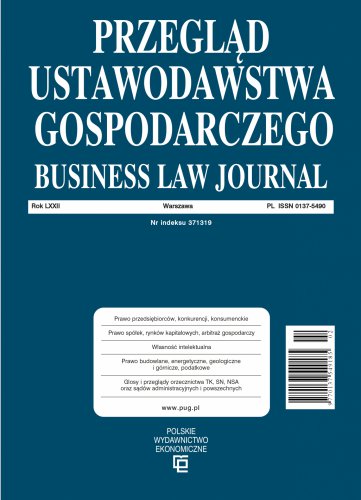Principles of imposing fines on "domestic entities" by the Bank Guarantee Fund
Since 2016 the Bank Guarantee Fund (BGF) has been authorized to impose fines on entities (banks, brokerage houses and credit unions) that violate certain obligations under their special resolution regime. The act sets the maximum amount of fines at the level of PLN 100 million, but gives the BGF free hand to apply lower fines. The directives for mitigating the amount of the fine leave the BFG a large scope of freedom of action. The catalogue of violations of the law for which a fine may be imposed is comprehensively formulated, but it is possible to repeatedly apply the penalty to the same entity who persistently violates the law. The proceeds from the fines go to the state budget, but in this respect an amendment to the act has been proposed, consisting in leaving these proceeds at the disposal of the BGF for the purpose of financing the restructuring measures. It has been shown that the fines imposed by the BGF are not only a sanction for violation of the law, but also a legal measure, the application of which should improve the effectiveness of the implementation of special resolution regime processes by entities avoiding cooperation with the BGF in this respect. In conclusion, it has been assessed that the fines imposed by the BGF are of a specific nature determined by many factors, including the status and tasks of the BGF, the purposes of applying these fines, as well as the place and role of domestic entities on the financial market. The final effect of properly conducted special resolution regime is not only to prevent the bankruptcy of a specific entity, but also to improve the situation on the financial market in general.
References
Bibliografia/References
Literatura/Literature
Banaszczak-Soroka, U. (2017). Komentarz do art. 303. W: P. Zawadzka, P. Zimmerman, R. Sura (red.), Ustawa o Bankowym Funduszu
Gwarancyjnym, systemie gwarantowania depozytów oraz przymusowej restrukturyzacji. Komentarz. Warszawa: C.H. Beck.
Bińkowska-Artowicz, B. (2015). Prawne aspekty informacji przekazywanych do Bankowego Funduszu Gwarancyjnego. Bezpieczny Bank, (4), 135–159.
Chochowski, K. (2010). Status prawny Bankowego Funduszu Gwarancyjnego. Studium administracyjnoprawne. Tarnobrzeg: Wydawnictwo Państwowej Wyższej Szkoły Zawodowej im. prof. Stanisława Tarnowskiego.
Czechowska, I. D. (2012). Bankowy Fundusz Gwarancyjny i Ubezpieczeniowy Fundusz Gwarancyjny jako ogniwa sieci bezpieczeństwa finansowego. Acta Universitatis Lodziensis — Folia Oeconomica, (274), 17–30.
Krawczyk, A. (2019). Komentarz do art. 189h. W: W. Chróścielewski, Z. Kmieciak (red.), Kodeks postępowania administracyjnego. Komentarz. Warszawa: Wolters Kluwer.
Kulesza, M. (2000). Bankowy Fundusz Gwarancyjny jako podmiot prawa publicznego — recydywa zapomnianego pojęcia. Glosa, (10), 2–18.
Majczak, P. (2020). Refleksje na temat kodeksowej regulacji kar administracyjnych. Ius Novum, (1), 131–151.
Ofiarski, Z. (2016). Fundusz stabilizacyjny BFG. Przegląd Ustawodawstwa Gospodarczego, (1), 2–10.
Ofiarski, Z. (2017). Prawo bankowe. Warszawa: Wolters Kluwer.
Przybysz, P. M. (2019). Komentarz do art. 189h. W: P. M. Przybysz (red.), Kodeks postepowania administracyjnego. Komentarz aktualizowany. Warszawa: Wolters Kluwer.
Radecki, W. (2020). Delikty administracyjne w prawie czeskim po reformie prawa wykroczeń z polskiej perspektywy. Prokuratura i Prawo, (1), 5–31.
Radecki, W. (2017). Odpowiedzialność za przestępstwa, wykroczenia i delikty administracyjne w prawie polskim, czeskim i słowackim. Prokuratura i Prawo, (10), 18–44.
Roszkowski, J. J. (2017). Opinia prawna dotycząca nowelizacji Kodeksu postępowania administracyjnego wprowadzonej ustawą z dnia 7 kwietnia 2017 roku o zmianie ustawy — Kodeks postępowania administracyjnego oraz niektórych innych ustaw. Narodowy Instytut Samorządu Terytorialnego. Opinie i analizy, (16), 1–27.
Sepioło-Jankowska, J. (2020). Kodeks karny skarbowy a reżim odpowiedzialności administracyjnej. Przegląd Ustawodawstwa Gospodarczego, (1), 8–12. https://doi.org/10.33226/0137-5490.2020.1.2
Skoczylas, A. (2010). Postępowanie egzekucyjne w administracji. W: R. Hauser, Z. Niewiadomski, A. Wróbel (red. nacz.), System prawa administracyjnego. Tom 9. Prawo procesowe administracyjne. Warszawa: C.H. Beck.
Sura, R. (2012a). Bankowy Fundusz Gwarancyjny jako podmiot administracji finansowej zapewniający bezpieczeństwo deponentów. W: J. Łukaszewicz (red.), Władztwo administracyjne. Administracja publiczna w sferze imperium i w sferze dominium. Rzeszów: Towarzystwo Naukowe Organizacji i Kierownictwa.
Sura, R. (2012b). Działalność Bankowego Funduszu Gwarancyjnego a interes publiczny. Studia Prawnicze KUL, (3), 87–97.
Sura, R. (2013). Bankowy Fundusz Gwarancyjny jako podmiot administrujący. Lublin: Wydawnictwo KUL.
Wojciechowski, Ł. (2016). Bankowy Fundusz Gwarancyjny jako instytucja bezpieczeństwa finansowego w świetle wybranych aspektów funkcjonowania systemu gwarantowania depozytów. Zeszyty Naukowe WSEI w Lublinie, (1), 17–29.
Wróbel, A. (2020). Komentarz do art. 189d. W: M. Jaśkowska, M. Wilbrandt-Gotowicz, A. Wróbel, Kodeks postępowania administracyjnego. Komentarz. Warszawa: Wolters Kluwer.
Pozostałe źródła
Sejm RP (2015). Uzasadnienie projektu ustawy o Bankowym Funduszu Gwarancyjnym, systemie gwarantowania depozytów oraz przymusowej restrukturyzacji, druk nr 215.
Sejm RP (2018). Uzasadnienie projektu ustawy o zmianie ustawy o Bankowym Funduszu Gwarancyjnym, systemie gwarantowania depozytów oraz przymusowej restrukturyzacji oraz niektórych innych ustaw, druk nr 2877.

